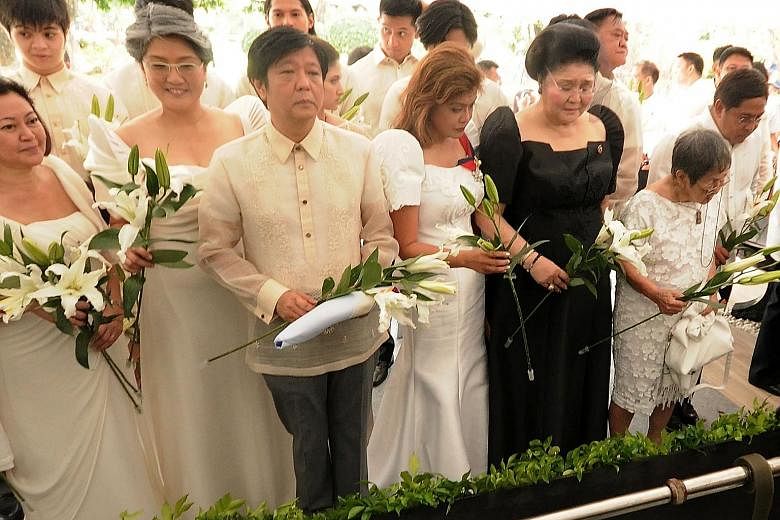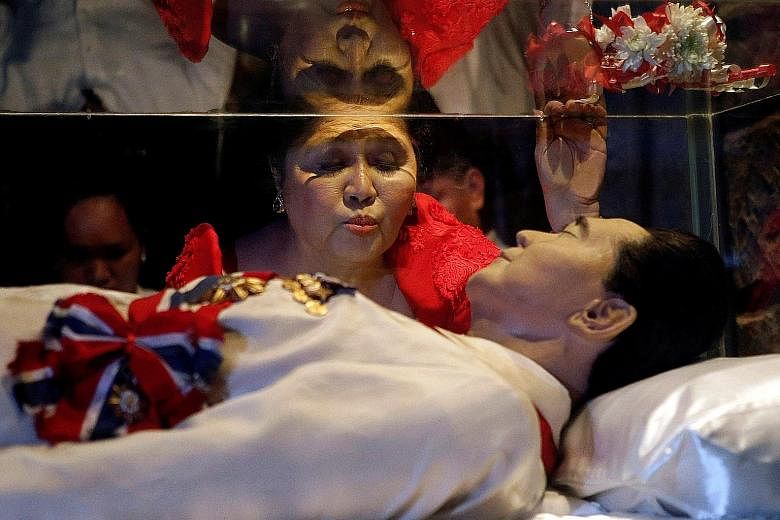Thirty years after he was toppled by "people power" and forced into exile, the late former Philippine dictator Ferdinand Marcos was yesterday given a burial in Manila's National Heroes' Cemetery, in what was decried as a "blitzkrieg burial" to head off protests.
The preserved body of Mr Marcos, previously kept in a glass casket in his hometown Batac in Ilocos Norte province, 470km north of the capital Manila, was flown by helicopter yesterday to Manila.
He was laid to rest after simple rites, attended only by his family, at a plot near three other former presidents.
"It was a very simple and very fast ceremony," said Chief Superintendent Oscar Albayalde, head of the police force in metropolitan Manila.
The burial came less than 10 days after the Supreme Court gave the green light for it last week, despite vociferous opposition from those who pointed to Mr Marcos' plundering of billions and jailing of innocents during his 20-year rule in the Philippines.
Mr Marcos was given military honours, including a 21-gun salute, said the military's spokesman, Brigadier-General Restituto Padilla.
A Philippine flag was draped over his wooden casket. A horse-drawn caisson took the casket to the tomb where Mr Marcos was finally laid to rest at noon, in line with a military tradition honouring soldiers.
The flag was later turned over to former first lady Imelda Marcos. Mr Marcos' children - former senator Ferdinand Marcos Jr, Ilocos Norte governor Imee Marcos and another daughter Irene - as well as surviving sister Fortunata, were also there.
While past governments refused to allow Mr Marcos' burial at the heroes' cemetery, President Rodrigo Duterte, an ally of the Marcoses, said he deserved to be buried in the heroes' cemetery as a veteran and former president.
In a statement read by Mr Duterte's spokesman Ernesto Abella in Lima, Peru, where he is attending an Apec summit, he said "he hopes everybody will find the space in their hearts to forgive".
"Let history judge me, but I will do what is legal," he said.
The timing of the burial came as a surprise to most. Brig-Gen Padilla said he was told about the family's wish for the burial to be held yesterday only hours earlier, at 5pm on Thursday.
Mr Abella said Mr Duterte himself was unaware of the burial date.
The secrecy stunned activists.
Vice-President Leni Robredo said: "Like a thief in the night, the Marcos family deliberately hid the information of burying (Marcos) today from the Filipino people."
She added: "He is no hero. If he were, obviously his family would not have to hide his burial like a shameful criminal deed."
Representative Edcel Lagman suggested that the body could still be exhumed, via a court order.
In its decision, the Supreme Court said Mr Marcos was not "dishonourably discharged" when ousted as president by a "people power" revolt in 1986, and was never convicted of "moral turpitude".
Mr Marcos, who fled with his family to Hawaii in 1986, was convicted of plundering up to US$10 billion (S$14 billion) from state coffers and overseeing widespread human rights abuses to decimate opposition to his rule. More than 90,000 were jailed, and nearly 6,000 tortured during martial law from 1972 to 1983. At least 2,500 people were summarily executed, with about 800 families yet to find a body to bury.
He died in exile in 1989, and his corpse was flown back to his hometown in the Philippines in 1993.


